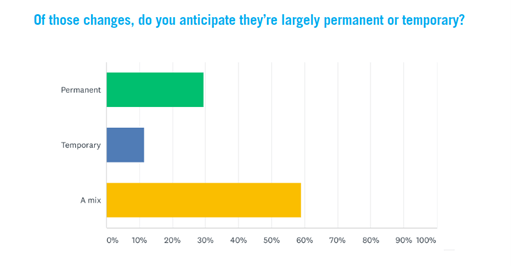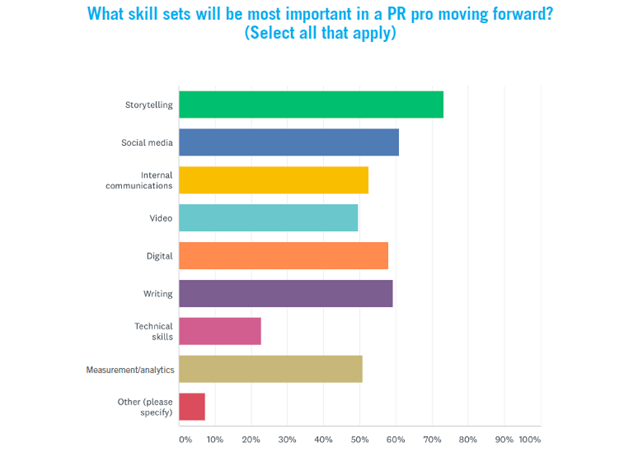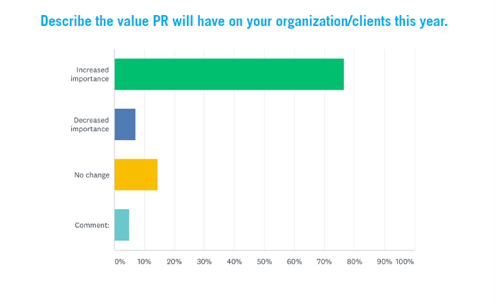How the pandemic has revealed a need for new comms skills
Here are the tools and tactics PR pros should master as the industry adapts to an ever-increasingly virtual world.

COVID-19 has accelerated changes that were already disrupting the business world, and employees must quickly adapt by learning new skills.
A skills gap was already a problem for many companies before the heavy disruption that came from lockdowns and remote work amid a global pandemic. McKinsey reported:
Even before the current crisis, changing technologies and new ways of working were disrupting jobs and the skills employees need to do them. In 2017, the McKinsey Global Institute estimated that as many as 375 million workers—or 14 percent of the global workforce—would have to switch occupations or acquire new skills by 2030 because of automation and artificial intelligence. In a recent McKinsey Global Survey, 87 percent of executives said they were experiencing skill gaps in the workforce or expected them within a few years. But less than half of respondents had a clear sense of how to address the problem.
Now McKinsey says that gap is growing and goes beyond adapting to remote work or learning to use AI systems. In order to be effective, workers are going to have to upskill and reskill to stay ahead of a fast-changing workplace and new business models.
That’s especially true for the PR world. In Ragan’s report “The Future Role of the PR Pro,” only 11% of respondents said that they expect COVID-19 changes to be temporary.

So, what are the skills that have become crucial for PR pros over the last six months of intense crisis and disruption?
‘Soft’ skills are crucial
Agility will be a top trait for the communications professional of the future, says Sabrina Browne, account director, corporate with BCW.
“PR professionals must be able to adapt to changing environments of the pandemic through their individual flexibility and ingenuity, as well as the resources and tools afforded to them in their workplace,” she says.
Michelle Garrett, a solo PR pro, agrees. Her watch word is “adaptability.”
“Yes, it’s good to plan, but as we’ve seen in the past months, plans can quickly change,” she says. “It’s safe to say that few anticipated this pandemic was going to affect businesses in the way that it has. So all the planning in the world can be for naught if you don’t know how to adapt to changes in the landscape/marketplace.”
Heather Caufield, a vice president with G&S Business Communications, has a different take. Her top trait for the communicator of the future is “empathy.”
“To be successful in this environment, we’ve had to acknowledge the hard days, be honest when we’re facing a challenge and jump in to help others when possible,” she says. “This can be difficult to do over a video chat, but the simple act of starting out a team meeting or one-on-one with ‘how are you feeling today?’ can go a long way.”
Browne agrees on the importance of empathizing with others during this difficult time. “Our homes are now our office, daycare, school, college and everything in between,” she says. “Empathetic leadership has never been more valuable to the teams you lead each day.”
Browne also has one more skill that PR pros must master in the current landscape: organization.
“The COVID-19 pandemic has forced us all to home in on our project management skills,” she says. “As we lead and manage teams who are operating in different time zones and regions with varied working hours.”
Browne also says that agility, adaptability and empathy are top skills for other PR pros in her network. An informal poll on her LinkedIn profile asked her colleagues to weigh in on the top skill for a PR pro to have. Agility, adaptability and empathy topped the list.
Looking to the future
What are the skills that future PR pros will find most useful? In Ragan’s Future Role of the PR Pro report, storytelling led the way as a crucial skill:

Garrett makes the case for a tried-and-true skill for the PR set: writing.
“Writing is the foundation of almost everything we do in PR,” she argues. “Making a video? You need a script. Using content marketing to help promote your business? You need to write. Is social media part of your role? Of course, you must be a strong writer.”
According to Garrett, writing acumen is job security for a PR professional.
Browne says it’s essential to be able to onboard new digital skills to meet the needs of increasingly sophisticated clients.
“Whether it’s learning to master a client presentation on Microsoft Teams or navigating the breakout function during a virtual press conference on Zoom, these digital skills have become paramount to the PR professional’s playbook,” she says. “Now, you must be able to strategically assess how your clients generate ROI in this new landscape, while reaching and engaging key stakeholders and enticing media in a virtual format with content that is compelling.”
Caufield points to something a little less tangible as the key decider for PR success in the future. She defines it as a willingness to jump in, embrace uncertainty and move forward.
“The agency world is always dynamic when it comes to client budgets, but this year has seen significant shifts and an acceleration of the ‘project trend,’” she explains. “A willingness to jump in on new opportunities will continue to be required.”
One area where “willingness” and “adaptability” will be tested is in media relations campaigns set against a major presidential election. Caufield’s advice? “Buckle up.”
Keeping it positive
It’s not all doom and gloom, particularly for communicators who are seeing an increased belief in their value to the organization.

Caufield points to increasingly data-savvy campaigns as proof of the bright future for the PR industry.
“The days of pursuing any and all media opportunities and developing content just for the sake of showing activity are—and should stay—behind us,” she says. Instead she sees communicators earning a bigger seat at the table as they learn to show how PR benefits business priorities.
For Browne, the silver lining is the creative ingenuity that has been brought forth by the pandemic.
“The creative decisions that may have taken two months to make in the past are sometimes now being made in two weeks,” she says. “We are not only moving at an accelerated pace, but with heightened agility and strategy to meet various objectives.” She adds that the increased pace is not just speed for speed’s sake.
“We are not only meeting our target demographic where they are, we are living through the pandemic and experiencing this new normal, together,” she says.
Garrett says that the future is particularly bright for PR pros that specialize in telling digital stories. Online marketing and PR have “taken center stage” she says, as brands have been shut out from other outlets to connect with key audiences.
For communicators with a digital-first skillset, the opportunities are endless.
“This is something every business owner should have been thinking about before, but when you see stats like 40% of small businesses don’t have a web site, you wonder how they’re going to manage to stay afloat in the future,” she says. “Having a site, being on social media, and leveraging PR and content have all now become vitally important to businesses that want to thrive.”
This article is in partnership with News Direct.








What may bring sharply higher PR billings and earnings is not only new communication skills but also new recognition of what communication can accomplish in Washington.
FOR COMPANIES: More freedom from excessive government regulation.
FOR ASSOCIATIONS: More opportunity to build membership.
FOR COUNTRIES: More protection thanks to America’s might.
FOR PR FIRMS: More billings like never before.
New reality in post-election Washington: Some may have to pay more to government and some may get less. Instead of our national and state treasuries being like a glass half full or half empty, people may correctly see the glass as damn near bone dry although the public has huge thirst for funds to recover from pandemic-caused economic damage.
The astute in PR will see this as both a challenge for the government and an opportunity for companies that help our economy meet the challenge. Great PR firms will ask top management: “What would you like government to do if you could have anything you want?” A daydream it may not be thanks to demand and supply realities.
As demand for government money soars, those who govern will have soaring incentive to kill government regulations that restrain business freedom to create jobs, earn income and pay taxes.
As government looks at not only who shall pay more but also who shall get less, health industry and other associations may grow sharply in membership and budgets.
As our Arab allies and other smaller countries recognize their military weakness and admire America’s military strength, the more savvy national leaders abroad may seek urgently to win the hearts and minds of America’ public to recognize that alliance with national good guys can be good for not only their safety but ours.
As PR firms recognize the opportunity for corporate and national clients to win in Washington, we may see more PR programs that bill for upwards of $10 million a year. Washington decisions can make this well worth it, and the decisions of corporate and national leaders can make the money not just available but enthusiastically so.
New PR realities will likely include new recognition about what established realities can mean in our land of the free and our home of the brave. Winning in Washington can mean freedom from unduly restrictive regulation, but not misguided quest for freedom from communication costs. “Home of the brave” can refer to not only brave officers and troops who fight in wars that protect America but also to admirable companies and countries that bravely communicate how things an be better if Washington leaders wage PR war to benefit government and the governed alike.
Business Roundtable, according to the online O’Dwyer’s Newsletter of PR and marketing communications, has made an important “Statement on the Purpose of a Corporation.” Says O’Dwyer’s: “PR firms cheered the prospects of lining up assignments from Big Business, eager to highlight their newly found commitment to ESG and purpose-driven stakeholder capitalism. General Motors, Exxon Mobil, Carrier, American Express, JP Morgan Chase, AT&T, Interpublic, Fox Corp and IBM signed the pledge.”
With PR wisdom such pledges can benefit the government, the governed, and the communicators who think bigger than in the past and accomplish more.